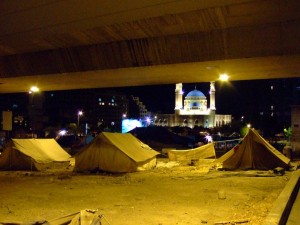In May 2008, Hizbollah militia occupied the west of central Beirut, demanding that the airport head of security – dismissed for alleged links to the resistance party – be restored to his post. They had been camping out around Place des Martyrs and, when matters escalated, they blocked the route to the airport. In addition to the usual daily three-hour power cuts, the tap water slowed to a trickle and stopped. For my mother-in-law, who fled Lebanon in 1976, a second civil war has already begun. She distributes our ration of two bottles of water for washing and teeth-brushing from her emergency stock in the laundry room. Forgetting that for once the power is working fine, I carefully wash my hands in the dark with the precious water. For several days, gun battles raged in downtown Beirut, Aley and Tripoli, until Hizbollah’s demands were met and they magnanimously handed control back to the Lebanese Army. Meanwhile we stick to the safer areas of Jbeil, where we have the Crusader Castle to ourselves, and Jounieh where we are far from alone – the crowds of Gemmayze and Hamra have transferred here and music blares from the convertible BMWs as unfazed Beirutis get on with their partying against the odds.
